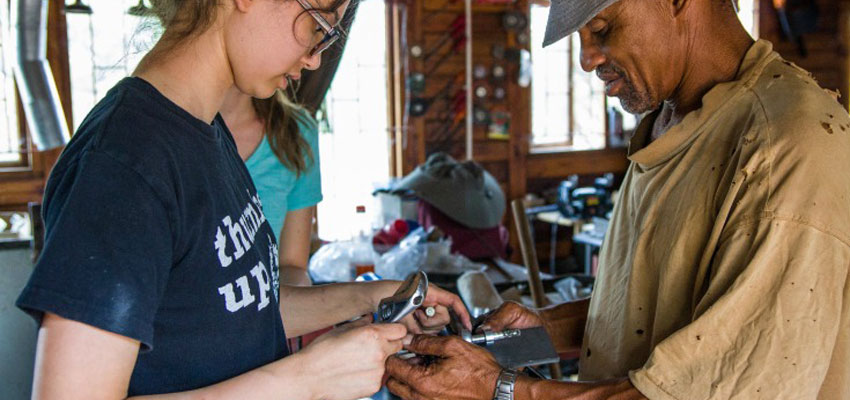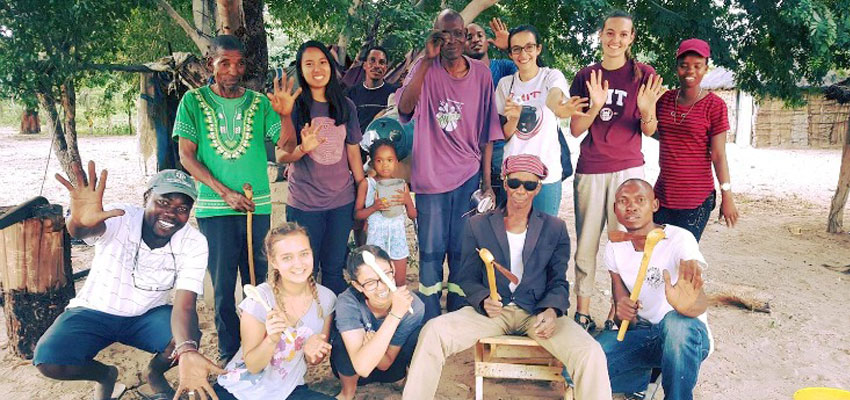
Breaking it Down and Building it Up in Botswana
In January 2018, a team of five students from the D-Lab: Development class traveled to D’kar and Kaputura, Botswana for three weeks of project work, relationship building, and cultural experiences. Asli Demir ‘19, Caroline Jordan ‘20, Danielle Gleason ‘20, Rianna Jitosho ‘19, and Veronica LaBelle ‘19, as well as their trip leader, Justin Carrus ‘17, partnered with local organization These Hands founder and community partner Thabiso Blak Mashaba for the trip.
Our team first traveled to D’kar, where These Hands was host to two International Development Design Summts, IDDS D'Kar 2015 and IDDS Botswana 2016. Over the course of a week and a half, the students worked closely with community members to advance and bring to closure several projects from IDDS 2016. We really enjoyed the collaborative experience and learning about local culture as well as new perspectives on design and engineering from their community partners.
After a brief stop in Maun, we traveled to Kaputura, where we spent a week focusing on replicating the box bellows they designed over the fall semester with local materials, as well as conducting a needs assessment for the local carpenter. While in Kaputura, we also visited Bana ba Metsi, a boarding school for at-risk youth, where we held a Creative Capacity Building event.
The Details from D’Kar
One project in D’Kar featured a brick press that was unique in that the bricks produced could be used to construct round homes, similar to the traditional rondavel in Botswana. Collaborating with D’kar local Khomsa Sixpence, team members Danielle Gleason and Rianna Jitosho worked to improve the existing design, with a focus on ergonomics and efficiency. The project was brought to the stage where the D’kar Innovation Center can begin to either rent out the press, or begin selling bricks to community members.
Another project focused on generating income for the Innovation Center was the Easy Ncoro Washing Machine. The team improved the functionality and ergonomics of the existing machine, as well as conducting user tests of the machine’s operation and wash power. At the end of the team’s stay in D’kar, the machine was fully functioning and ready to be used by the community.
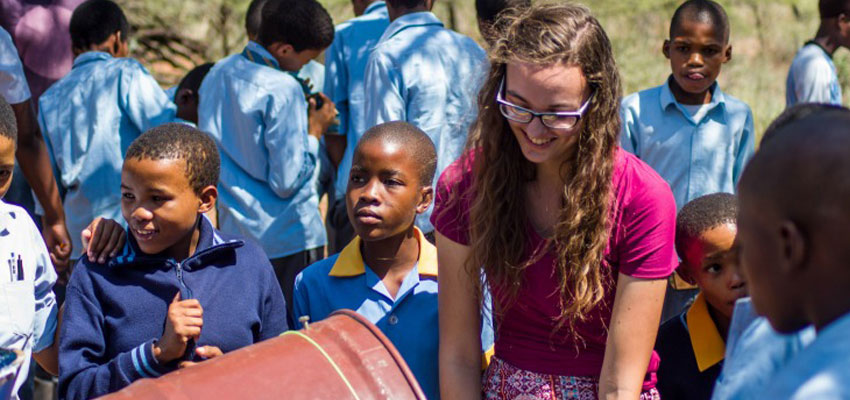
A third project focused on improving the design of an existing rocket stove, which uses otherwise useless brush as firewood. Firewood is scarce in D’kar, and the project saw significant interest when it was displayed at a community showcase.
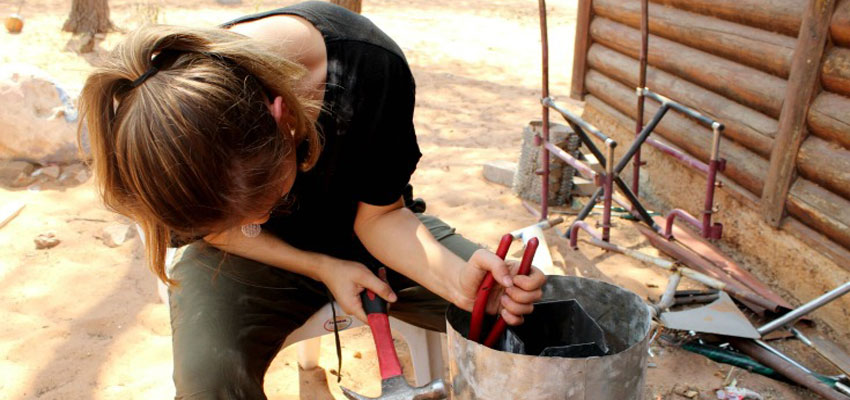
The final project aimed to simplify the long, labor-intensive process of making beads from ostrich eggshells. The traditional project involves drilling holes and twisting fibers by hand, both of which could cause scarring and pain over time. The team worked on improving a pedal-powered grinding wheel machine, adding a drill with an adjustable stand and a hook to twist the fibers, to remove the sources of injury.
At the end of their time in D’kar, the team hosted several classes from the local primary school at a community showcase. The primary school students enjoyed seeing the projects, and several even returned to the Innovation Center after school to learn how to use some of the tools.
What’s Kicking in Kaputura
After spending an intermediate day in Maun, the team then travelled to Kaputura, a smaller village up north by the Namibian border and up the Okavango Delta panhandle. This was the third D-Lab visit to the village, and thus a large focus of the team’s visit was on making a bellows with Michael, the local blacksmith, whose setup involved crouching on the ground and using a bellows that didn’t efficiently provide airflow to his fire. Team members Veronica ‘19 and Rianna ‘19 built multiple prototypes of a bellows system, adapting the design to two buckets to reduce cost.
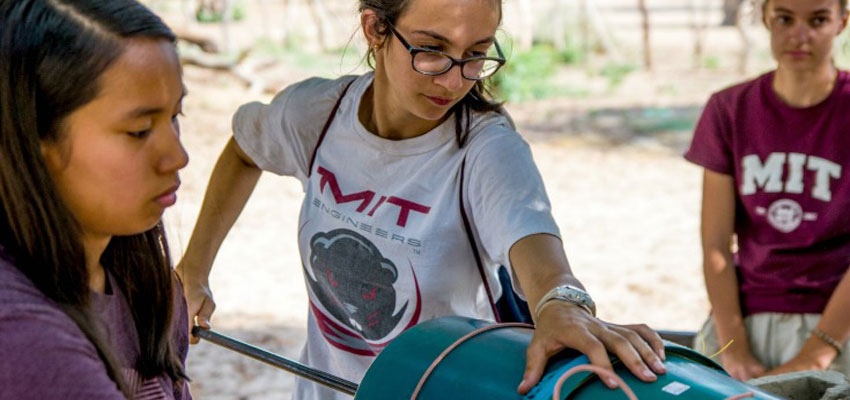
By the trip’s end, they had a completed bellows fitted to his standing forge (built by the D-Lab team January 2017). The new bellows provided continuous airflow, increasing the working temperature of the metal and improving Michael’s setup. Importantly, the new design allowed Michael to begin working while standing. Additionally, the team constructed a foundry able to exceed temperatures of 700°C, allowing them to melt aluminum cans in a crucible and even cast the molten metal in the sand! Michael and the village were ecstatic to have improved conditions as well as the potential to further pursue casting, such as pots and other tools.
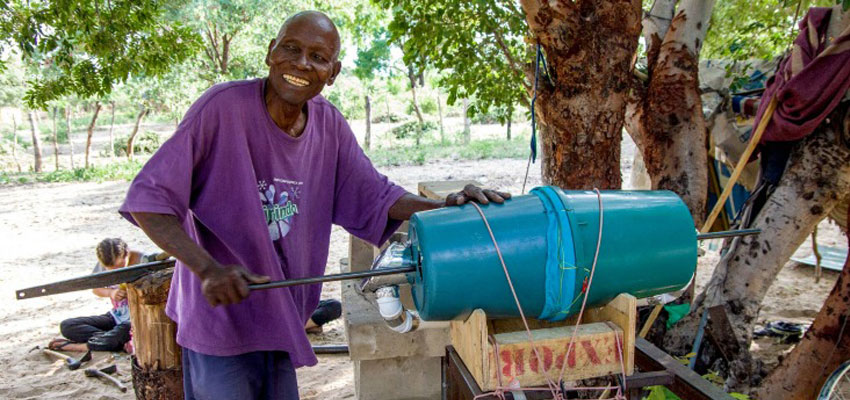
The other members of the team worked with the local carpenter to identify potential future projects. The team spent a day going through the process of walking several kilometers through the bush to collect the correct type of wood, splitting the wood, and carving spoons. Several potential paths for future projects were identified, particularly focused on safety equipment for the carpenter.
During our stay in Kaputura, we took two days away from the village to visit Bana ba Metsi. Bana ba Metsi is a boarding school for at-risk boys aged 13 to 18 who have dropped out of primary school. A major part of the school’s curriculum involves hands-on training. However, their curriculum does not include things like the design process or leave much room for individual expression and creativity. The team visited Bana ba Metsi for a two-day Creative Capacity Buiding workshop, where we introduced the students to the design process, completed design challenges, and toured the campus to identify possible projects. The training culminated in a series of build-its on the second day.
Journey’s End
At the end of it all, we had successfully completed several projects, allowing for increased potential of income generation technologies in both communities. Reflection led us to not only have a refreshed appreciation for our own privileges, but also to admire the local community members we connected with along the way.
In addition to project work, we learned how to dig for tubers, make arrowheads, find watering holes from animal tracks, make beads, herd goats, eat cactus fruits, and trap ostriches. We washed our hair in buckets, carried water from taps, and made dinner over the fire. Inside jokes were made, songs were sung, and friendships were forged.
We would like to extend our heartfelt gratitude to D-Lab, our community partners, and everyone else who made this trip possible — we are so thankful for the memories and connections made and look forward to following them on what happens next!
